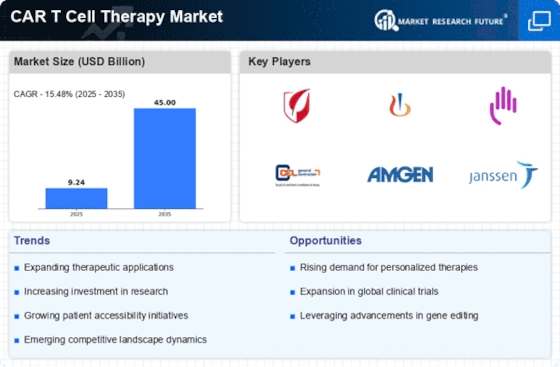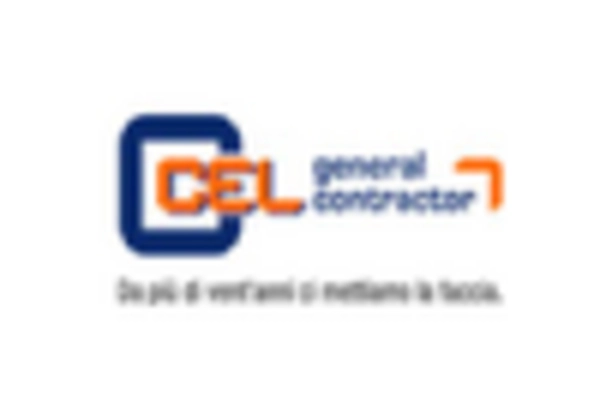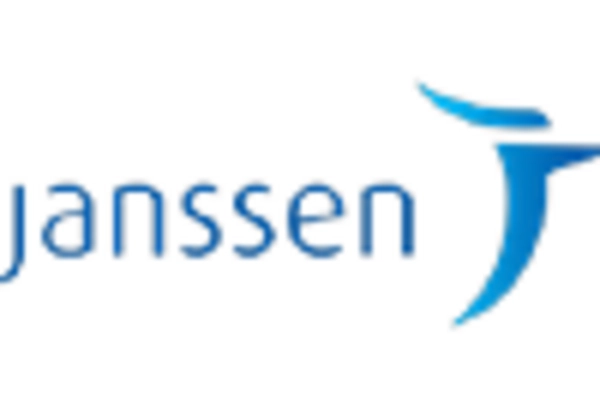Market Trends
Key Emerging Trends in the CAR T Cell Therapy Market
Unlocking New Frontiers in Cancer Treatment: The Surge of FDA Approvals in CAR T Cell Therapies
In recent years, the landscape of cancer treatment has witnessed a transformative wave, driven by a surge in FDA approvals for therapies utilizing Chimeric Antigen Receptor (CAR) T cells. This paradigm shift is reshaping the possibilities for cancer patients, offering targeted and personalized treatment approaches. Let's delve into the dynamics of increasing FDA approvals in cancer treatment therapies, the notable players in this realm, and the anticipated impact on the global market.
A Glimpse into FDA-Approved CAR T Cell Therapies
The Food and Drug Administration (FDA) has been at the forefront of ushering in a new era in cancer treatment by approving several drugs and therapies. Among the notable approvals are Tisagenlecleucel (Kymriah), Axicabtagene ciloleucel (Yescarta), and Tocilizumab (Actemra), each contributing to the expanding arsenal against cancer.
Tisagenlecleucel (Kymriah): This FDA-approved CAR T cell therapy targets CD19 antigen types and is a formidable force in treating adult patients with B-cell lymphoma. Notably, it also extends its application to patients suffering from B-cell precursor acute lymphoblastic leukemia (ALL).
Axicabtagene ciloleucel (Yescarta): Another CD19-directed CAR T cell therapy, Axicabtagene ciloleucel, focuses on adult patients battling B-cell lymphoma. Its approval marks a significant stride in offering targeted treatment for this specific demographic.
Tocilizumab (Actemra): This therapy is designed to address cytokine release syndrome (CRS), a life-threatening condition associated with CAR T-cell therapy. Tocilizumab is approved for both adult and pediatric patients aged 2 years and above.
These FDA approvals signify a crucial shift towards recognizing the potential of CAR T cell therapies in diverse cancer scenarios, driving advancements that are reshaping the treatment landscape.
Expanding Applications: CAR T Cell Therapy for Pancreatic Cancer
Beyond the realms of lymphomas and leukemia, CAR T cell therapy is extending its reach to pancreatic cancer. The rise in pancreatic cancer cases has fueled the exploration of innovative treatment methodologies. Researchers are leveraging the adaptability and specificity of CAR T cells to develop effective strategies for addressing the challenges posed by pancreatic cancer.
Strategic Approvals Propel Market Growth
The strategic FDA approvals are not isolated events; they are integral to the broader narrative of advancing cancer treatment. The recent accelerated approval granted to loncastuximab tesirine-lpyl (Zynlonta) by ADC Therapeutics SA on April 23, 2021, further exemplifies the momentum in this space. Zynlonta, a CD19-directed antibody and alkylating agent conjugate, adds a potent tool to the array of therapies available for cancer treatment.
As these approvals align with the growing demand for combination immunotherapy approaches, they pave the way for a more nuanced and effective response to the complexities of cancer. Researchers and pharmaceutical companies are pushing the boundaries, exploring innovative avenues, and receiving regulatory nods that validate the potential of these advancements.
Panoramic Impact on Global Market Dynamics
The burgeoning FDA approvals in CAR T cell therapies are catalysts for the global market's trajectory. The ripple effect is anticipated to manifest in heightened adoption rates, increased investment, and a surge in research and development activities. With each approval, the confidence in CAR T cell therapies as a viable and potent option for cancer treatment grows.
Conclusion: A Transformative Horizon for Cancer Patients
In conclusion, the surge in FDA approvals for CAR T cell therapies marks a transformative horizon in cancer treatment. The approval landscape, extending beyond traditional applications, reflects a commitment to exploring novel solutions for diverse cancer types. As the momentum builds, patients can look forward to a future where personalized and targeted therapies redefine the possibilities in the battle against cancer. The strategic convergence of regulatory support, innovative research, and market dynamics heralds a promising era for those on the frontline of the fight against this formidable adversary.


















Leave a Comment